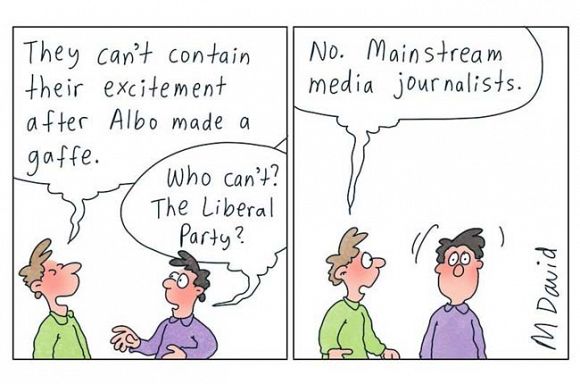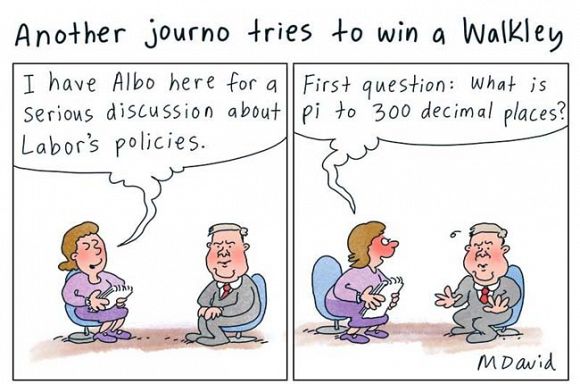Sunday’s episode of Insiders showed viewers exactly what media bias is all about and how, come election time, even some of the most respected journalists can fall into the trap of playing double standards.
Despite some criticism of the Liberal Government’s election campaign, more of the discussion focused on gotcha moments than actual policy.
Political editor for News.com, Samantha Maiden, began the discussion by declaring that Opposition Leader Anthony Albanese needed to “sharpen up”, having days earlier been unable to provide the exact statistic of people currently unemployed across Australia.
In the same breath, when referring to Prime Minister Scott Morrison, Maiden merely stated that he had committed a “blunder” at not knowing the price of bread and milk.
Maiden’s false equivalency between the two failings shows just how the media’s bias against the Labor Party has flourished over the years.
Just last week in an article in The Advertiser, Maiden said that:
‘Unlike the “gotcha” questions the Prime Minister, Scott Morrison, was asked at the National Press Club earlier this year – what’s the price of milk, bread and petrol? – these are not figures that bounce around and he should have known the answers.’
Everyone can forgive a brain freeze now and then.
Just think back to student exams, that moment you are asked a question to which you know the answer but you just can’t pinpoint it. A number rarely brought up in everyday life.
The price of bread and milk however, for most Australians, is far easier to remember.
For Australians struggling to find employment, or are facing the increasing wave of underemployment, the exact statistic is of less importance than the consequences of that predicament.
Let’s remember that official employment figures fail to include Australians who are working casual hours, struggling to make a living wage.
Perhaps this is where gotcha questions have their merit. Not to back politicians into corners where statistics get regurgitated like they are being read off a spreadsheet — rehearsed and memorised, not felt or experienced. But instead to highlight the broader social issues at play.
Unemployment, insecure work and failings in the welfare system have left a trail of vulnerable and, at times, angry Australians fighting to have their voices heard.
Both sides of politics have failed to adequately address this issue.
Scott Morrison has repeatedly told Australians that they will receive “a fair go for those who have a fair go”, failing to accept any responsibility for the conditions that force people into insecure work and welfare.
Likewise, Labor has failed to commit to a revue or action towards an increase in the rate of JobSeeker rates, instead choosing to emphasise an increase in social housing and rent asstance.
Maiden’s quizzing of both Albanese and Morrison’s awareness of simple living costs may have been “gotcha questions”, however, a journalist can only “get you” if you are unprepared.
Perhaps what Maiden meant was that during a federal election campaign all politicians ought to be doing their homework before fronting up to the media.
Particularly when attempting to show the public who can both manage the economy and understand the everyday struggles of working and vulnerable Australians.
As a university student, a young person, a woman and a person with a physical disability looking for opportunities to earn a living, whether or not a statistic was remembered plays less on my mind than the actual policies that are or aren’t on the Government’s agenda.
Not to mention the economic, gender, age and ability biases that so often play into how people are or are not able to secure work.
Maiden said that the prices of bread and milk “bounce around” — is that supposed to be a reference to whether you opt for plain white, sourdough or brown, full cream, skim or lactose free?
As someone who has spent significant time counting every dollar before entering the supermarket, you soon remember the price of 2 litres of skim milk is in the $2-3 dollar mark depending on the brand.
Semantic arguments about the fluctuation in prices of goods detract from the core issue of inequality and disadvantage.
In regard to unemployment figures, perhaps instead of asking why Albanese didn’t know the answer, the media should ask why the consequences of unemployment and underemployment are bigger issues in the public sphere.
We shouldn’t forget that journalists are, after all, the gatekeepers of knowledge in society.
Not only does the media report on political missteps and failings, but journalists are also the ones who decide what is considered important enough to emphasise.
They are the ones who determine that the everyday consequences of the increased cost of living, poor welfare and housing are less important in the day-to-day news cycle than whether or not a politician is or isn’t “on the ball” enough to pull a fact out of the air in front of a camera.
As much as I respect journalists like Sam Maiden, perhaps it is the media who needs to “sharpen up” and put inequality back on the public agenda.
That is not to say some journalists haven’t done just that.
There is still much to be done before structural inequality is given as much weight as a gotcha moment.
Melissa Marsden is a passionate advocate for social justice and a self-confessed political junkie. You can follow Melissa on Twitter @MelMarsden96.
Related Articles
- Mainstream media fails democracy in Election coverage
- Dud UK-based media index lauds News Corp and bashes ABC, SBS and IA
- Mainstream media blames unions for Perrottet's train lockout
- Mainstream media is Morrison Government's puppet
- Neoliberal principles guide journalism in Australia
 This work is licensed under a Creative Commons Attribution-NonCommercial-NoDerivs 3.0 Australia License
This work is licensed under a Creative Commons Attribution-NonCommercial-NoDerivs 3.0 Australia License
Support independent journalism Subscribe to IA.















